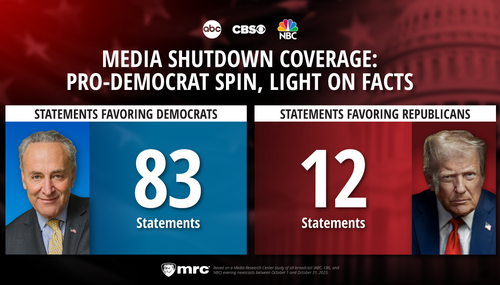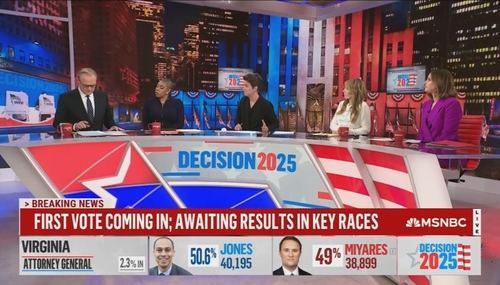On Friday night’s All Things Considered, National Public Radio paid tribute to feminism in two stories. Congressional reporter Andrea Seabrook celebrated the first female Speaker of the House, Nancy Pelosi, and then anchor Michelle Norris honored the twentieth anniversary of the feminist film Thelma and Louise.
In her story, Seabrook worried over the "sexists" who demonized Pelosi for her appearance and obsessed over the chauvinist sound of pronouns:
SEABROOK: Despite her work, she says, and the broadening role of women in society over the decades, Pelosi can still hear a certain edge in the voices of some men when they talk about her. When they say things like: SHE's doing it. It's HER fault.
PELOSI: I don't know if it's generational or what, but sometimes using "she" and "her" instead of the name of the person is not really intended to be mean-spirited, I don't think. It's just the tone that goes with it. So I don't have time to worry about that.
You know, I just don't have time to take offense or hold offense. It's just not important. They're going to do it anyway. And the more effective you are, the more they're going to do it. So you just have to decide, do I care about that, or do I care about getting a job done? And as I say over and over again, we came to do a job.
In this tinny little taxpayer-subsidized echo chamber, Seabrook can’t consider whether Pelosi dishes it out as much as she takes it. As if Nancy Pelosi never demonizes opponents? As if Nancy Pelosi can’t be oblivious to offensive ridicule? (Take her failure to condemn the Last Supper as a Leather Fetish poster in her own depravity-celebrating congressional district.) But it’s all sympathy for Seabrook, who sounded more like a campaign volunteer for Pelosi than a reporter:
SEABROOK: A quick Web search shows what she means. Pelosi is demonized and reviled by some whose attacks seem focused on things like her appearance and her ambition, rather than her ideas.
PELOSI: The only concern I have about the attacks that are made on me is that I don't want it to deter other women from saying: I want to go do that.
SEABROOK: After Democrats lost the House majority last November, Pelosi was elected minority leader, and the Republicans took control of the House. Now, Pelosi worries that the attempt to defund Planned Parenthood, which provides birth control and women's health exams as well as abortions, is a setback. But then, she also thinks any leftover sexism in politics will die away.
 Did you catch that? NPR and Pelosi are suggesting that "leftover sexism" and anti-abortion politics are similar, perhaps exactly similar. But if so, how could they possibly suggest it’s "dying away"? The massive conservative wave that swept Pelosi out of power wasn’t a "pro-choice" tide. (In the online version, allegations of sexism are visually set next to headless men holding RNC "Fire Pelosi" signs.)
Did you catch that? NPR and Pelosi are suggesting that "leftover sexism" and anti-abortion politics are similar, perhaps exactly similar. But if so, how could they possibly suggest it’s "dying away"? The massive conservative wave that swept Pelosi out of power wasn’t a "pro-choice" tide. (In the online version, allegations of sexism are visually set next to headless men holding RNC "Fire Pelosi" signs.)
SEABROOK: The public, she says, is way ahead of politics in terms of women in power. And the young women and girls of today prove it.
PELOSI: In my generation, it was like halt. But in theirs, it's full speed ahead. So I don't have any worry about what it means for my children and grandchildren. They'll have every opportunity.
I was thinking of my mother today earlier, and I thought, oh, my gosh, if she were born, you know, some decades later, what she would have done. Just a remarkable woman. But it's about the future. And I think that nothing is more wholesome to the political process and the process of government than the greater participation of women.
SEABROOK: Pelosi's advice to women rising in their careers who meet resistance from someone with other ideas of a woman's proper role?
PELOSI: It's their problem. You know, it's the problem of these people who harbor this anger, and you can't let their anger take you down.
SEABROOK: Focus, she says. Don't get dragged into it. The news showing women in politics more often as problems or props for their husbands' political campaigns, you don't have to believe that story, Pelosi says. Just look at her. She was a girl who chose to use her life and career to answer the question: Do women think? Andrea Seabrook, NPR News, Washington.
That refers back to the beginning of Seabrook's feminist reflections:
SEABROOK: When talking about women in politics, Nancy Pelosi thinks back to her high school debate team. It was 1958, and several schools came together to compete in extemporaneous debate. A young Nancy D'Alesandro watched a friend reach her hand into a fishbowl filled with debate topics on little scraps of paper. She pulled one out and read...
PELOSI: The question was this simple: Do women think?
SEABROOK: Do women think? For Pelosi, the memory is a reminder of how far she's come.
Is it possible that Pelosi's exaggerating? For NPR, it's simply too good to check. Surprisingly, the usual NPR musical bumper wasn't Helen Reddy singing "I Am Woman."
NPR is very much a network for Thelma and Louise fans, and not so much for people who thought it was a feminist cartoon, where most of the men were piggish dolts and there was no justice for a rape victim. But anchor Michelle Norris made it sound like every woman in America loves this movie:
Twenty years ago this month, two women tore across the American West in a green 1966 Thunderbird convertible and straight into movie history. Thelma and Louise weren't just liberated in a man's world, they were fighting mad and unlike anything that had come out of Hollywood before. The pair entered the cultural lexicon. Women today still roar with laughter when they know they're having a Thelma and Louise moment.
Norris couldn't wonder whether the male characters are perhaps a little overdone or atypical:

CALLIE KHOURI: Every film, especially a road movie, has to have a villain, so the character of Harlan was certainly that.
NORRIS: He was the person who tried to rape Thelma?
KHOURI: Yes, the attempted rapist. And then, you know, the husband, I mean, I think that's somewhat believable, and I mean that in terms of having to ask permission to go somewhere if you're going on a trip. You know, not really being in control of your money or any of that stuff. The kind of misogyny that I was showing was so commonplace as to not even be recognizable, and I think, in some ways, that that's why men took exception to it because it was finally being shown from a female point of view, and therefore you could see what it was like on the other side of it. And I think some men took great exception to it.
Not all men, by the way. I mean, if I had a nickel for every man who would've told me that - how much he loved the movie, I would have a huge mansion made of nickels.




